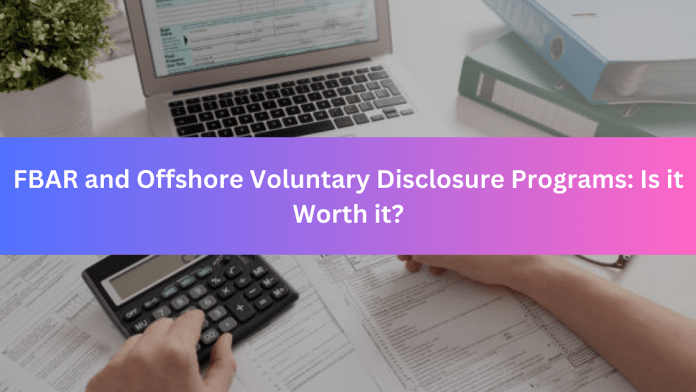The Foreign Bank and Financial Accounts Report (FBAR) is a requirement for U.S. citizens and residents who have financial interests in foreign bank accounts or assets that exceed a certain threshold. Failure to comply with FBAR filling requirements can result in severe penalties, including fines and even criminal charges. In this blog, we’ll explore the Offshore Voluntary Disclosure Programs (OVDP), which provide a way for taxpayers to come into compliance with FBAR requirements and avoid penalties. We’ll discuss whether participating in the OVDP is worth it for taxpayers.
What is FBAR?
FBAR is a requirement for U.S. taxpayers who have financial interests in foreign bank accounts or assets. Taxpayers must report these interests annually on FinCEN Form 114. The threshold for reporting is currently $10,000 in aggregate value for all foreign accounts or assets.
Penalties for Failure to Comply with FBAR
The penalties for failing to comply with FBAR requirements can be severe. The IRS can impose both civil and criminal penalties, depending on the severity of the violation. Civil penalties can range from $1,000 to $100,000 per violation, while criminal penalties can result in fines of up to $500,000 and up to 10 years in prison.
What is the Offshore Voluntary Disclosure Program (OVDP)?
The OVDP is a program that allows taxpayers to come into compliance with FBAR requirements and avoid penalties. Taxpayers who participate in the program must disclose their foreign accounts or assets and pay any back taxes and penalties owed. In exchange, they receive reduced penalties and avoid criminal prosecution.
Pros and Cons of Participating in the OVDP
There are pros and cons to participating in the OVDP. The primary benefit is the ability to avoid severe penalties and criminal prosecution. Taxpayers who participate in the OVDP can also reduce their penalties and potentially negotiate a favorable settlement with the IRS. However, there are also downsides to participating in the OVDP. Taxpayers must disclose their foreign accounts or assets and pay back taxes and penalties, which can be costly. Additionally, participating in the OVDP can trigger an audit or investigation by the IRS, which can be time-consuming and stressful.
Alternatives to the OVDP
There are alternatives to the OVDP that taxpayers can consider. One option is the Streamlined Filing Compliance Procedures, which are designed for taxpayers who have non-willful violations of FBAR requirements. Another option is to opt out of the OVDP and negotiate a settlement with the IRS directly. Taxpayers should consult with a tax attorney or other qualified professional to determine the best course of action for their specific situation.
Who Should Consider Participating in the OVDP?
The OVDP is designed for taxpayers who have willfully failed to comply with FBAR requirements. This includes taxpayers who intentionally failed to report foreign accounts or assets or who knowingly provided false or misleading information on their tax returns. Taxpayers who have non-willful violations of FBAR requirements may be better suited for alternative programs or negotiations with the IRS.
Steps to Participating in the OVDP Participating in the OVDP requires several steps, including submitting an initial letter of intent, providing all required financial information, and making a formal voluntary disclosure. Taxpayers must also pay all back taxes and penalties owed. The process can be complex and time-consuming, but a tax attorney or other qualified professional can help guide taxpayers through each step.
Recent Changes to the OVDP
The OVDP has undergone several changes in recent years. In 2018, the IRS announced that it would be ending the program, but taxpayers with ongoing OVDP cases could still participate. The IRS has also implemented new procedures for taxpayers who have non-willful violations of FBAR requirements, such as the Streamlined Filing Compliance Procedures. Taxpayers need to stay up-to-date on any changes to the OVDP and other FBAR compliance programs.
Potential Risks of Not Participating in the OVDP
Taxpayers who have willfully failed to comply with FBAR requirements and choose not to participate in the OVDP may face severe penalties and criminal prosecution. The IRS has ramped up enforcement efforts in recent years, and taxpayers who fail to disclose foreign accounts or assets are at risk of being caught and facing significant penalties. Participating in the OVDP may be the best way for taxpayers to avoid these risks.
Working with a Tax Attorney Navigating
FBAR requirements and the OVDP can be complex and daunting. Working with a tax attorney who specializes in these areas can help taxpayers make informed decisions and avoid costly mistakes. A tax attorney can guide the OVDP and alternative compliance programs, negotiate with the IRS on behalf of the taxpayer, and help ensure compliance with all requirements.
Conclusion
The decision to participate in the OVDP is a significant one that should be carefully considered by taxpayers who have willfully failed to comply with FBAR requirements. While the program provides an opportunity to avoid severe penalties and criminal prosecution, there are also downsides to participating. Taxpayers should weigh the pros and cons of the OVDP and consider alternative options, such as the Streamlined Filing Compliance Procedures or negotiating directly with the IRS. Working with a Washington DC tax attorney can help ensure compliance with all requirements and minimize risks.
